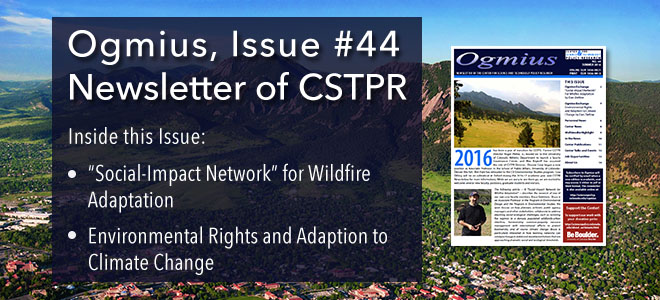
Ogmius
Issue #44, Summer 2016
Ogmius Exchange
“Social-Impact Network” For Wildfire Adaptation
by Daniel W. Zietlow, Ph.D., CSTPR Writing Intern
The following article — A “Social-Impact Network for Wildfire Adaptation” — describes the research of one of our new core faculty members, Bruce Goldstein. Bruce is an Associate Professor in the Program in Environmental Design and the Program in Environmental Studies. His work focuses on how planners, activists, public agency managers and other stakeholders collaborate to address daunting social-ecological challenges, such as restoring fire regimes in a densely populated wildlands-urban interface, harmonizing common-property resource management with international efforts to protect biodiversity, and of course climate change. Bruce is particularly interested in how learning networks can catalyze change in stable and durable institutions that are approaching dramatic social and ecological thresholds.
In the face of natural hazards, resource scarcity, climate change, and other social-ecological challenges, how does a community adapt, and how can communities combine forces to contribute to transformational change? Dr. Bruce Goldstein, an associate professor in Environmental Design and Environmental Studies and core faculty at the Center for Science and Technology Policy Research (CSTPR) at the University of Colorado Boulder takes on this pressing question.
At first glance, the root cause of environmental crises is too daunting for communities to tackle; however, Goldstein sees communities as the engine for institutional transformation. By organizing themselves into “learning networks,” communities can apply local knowledge to address issues that are very specific to their place and time, and team together to transform unstable practices into sustainable ones. Learning networks enable people to create new ideas by serving as a laboratory for best practices, and a forum for addressing basic questions like, “What is the system in which I live and how do I want to change it?”
Let’s take a look at wildfires, a pressing issue here in the western United States and one that Goldstein actively tackles. According to the Forest Service, an average of more than 73,000 wildfires burn about 7.3 million acres (over 2.9 million hectares) of land annually. Locally, Colorado experienced 6 major wildfires since 2012 that burned over 240,000 acres (over 97,000 hectares) of land, with many smaller fires occurring during this time. Typically, wildfire impacted regions rely on a fire agency to protect them and mitigate the wildfire once it has started. Because of this, around 70% of the Forest Service budget goes towards fire suppression. Yet wildfires are a natural and necessary ecological process. Efforts to suppress them only make wildfires more likely as fuels accumulate in even-aged stands, producing increasingly intense fires that are both more deadly and ecologically destructive. We therefore need to rethink how we approach wildfires and change our mindset from “suppression” to “adaptation and ecological restoration.” Read more …
Ogmius Exchange
Environmental Rights and Adaption to Climate Change
by Daniel W. Zietlow, Ph.D., CSTPR Writing Intern
We also highlight the research of Steve Vanderheiden, who joined CSTPR as a core faculty member in 2015. Steve is an Associate Professor of Political Science and Environmental Studies at the University of Colorado Boulder, as well as Professorial Fellow at the Centre for Applied Philosophy and Public Ethics (CAPPE) in Australia. He joined the CU Boulder faculty in 2007, and specializes in normative political theory and environmental politics, with a particular focus on global governance and climate change. In addition to numerous published articles and book chapters on topics ranging from Rousseau’s environmental thought to the politics of SUVs, and edited books on political theory approaches to climate change, energy politics, and environmental rights, his Atmospheric Justice: A Political Theory of Climate Change (Oxford, 2008) won the 2009 Harold and Margaret Sprout award from the International Studies Association for the best book on international environmental politics. Steve received his Ph.D. from the University of Wisconsin-Madison.
When you think of climate change, you typically think of the physical changes occurring on Earth: the increased average temperatures, changes in rain patterns leading to drought conditions, the melting of sea ice, rising sea levels. You might also think of the ways we’re trying to combat it: becoming more energy efficient and pushing for renewable power, buying locally grown food, carbon dioxide emission limits, efforts to decrease water usage. What you may not necessarily think of, though, are the issues surrounding the global governance of climate change. Enter Steve Vanderheiden, an associate professor at the Center for Science and Technology Policy Research at the University of Colorado.
Vanderheiden specializes in normative political theory and environmental politics, with a particular interest in equity issues, democratic issues, and environmental issues as they pertain to climate change. In a society that is actively trying to adapt to a changing climate, an interesting question becomes what environmental rights should now look like, particularly territorial and water rights.
Let’s take a look at questions about carbon accounting, where countries, companies, or individuals measure greenhouse gas emissions as a metric for their “carbon footprint.” There is a debate between those who think we should calculate carbon footprint based on production of carbon dioxide versus those who think it should be based on consumption. Currently, private firms can get carbon offsets by claiming to make carbon sinks where carbon dioxide is removed from the atmosphere. Vanderheiden ponders how natural carbon sinks, such as forests or oceans, should be accounted. A forest in Canada is presumably owned by Canada, but should the carbon dioxide consumed by this forest count as a credit towards Canada’s carbon footprint? And what happens to this credit if the forest burns or is cut down for logging operations? Territorial rights, Vanderheiden argues, are thus incomplete because most have been developed for resources in and not above ground. Read more …

